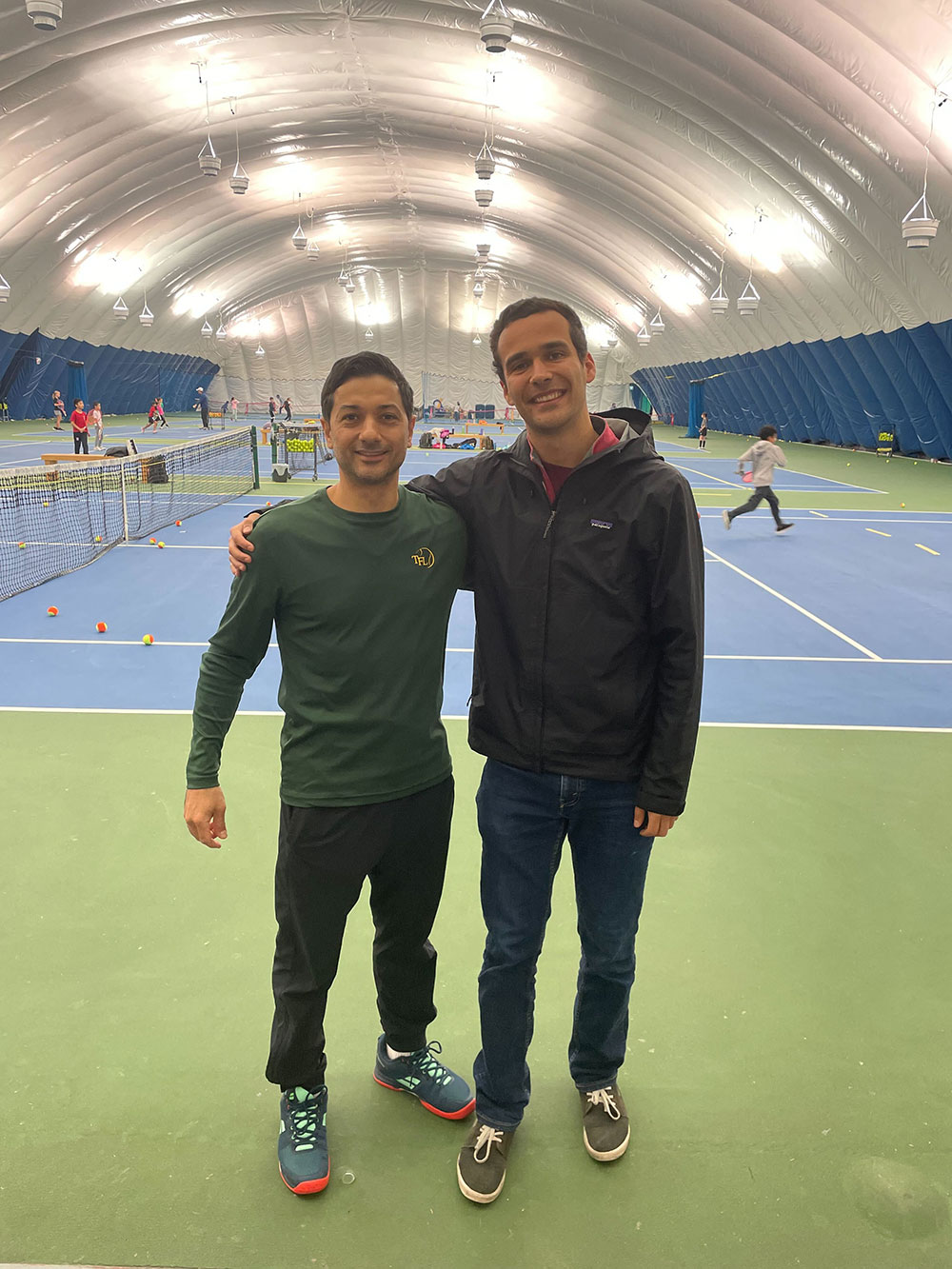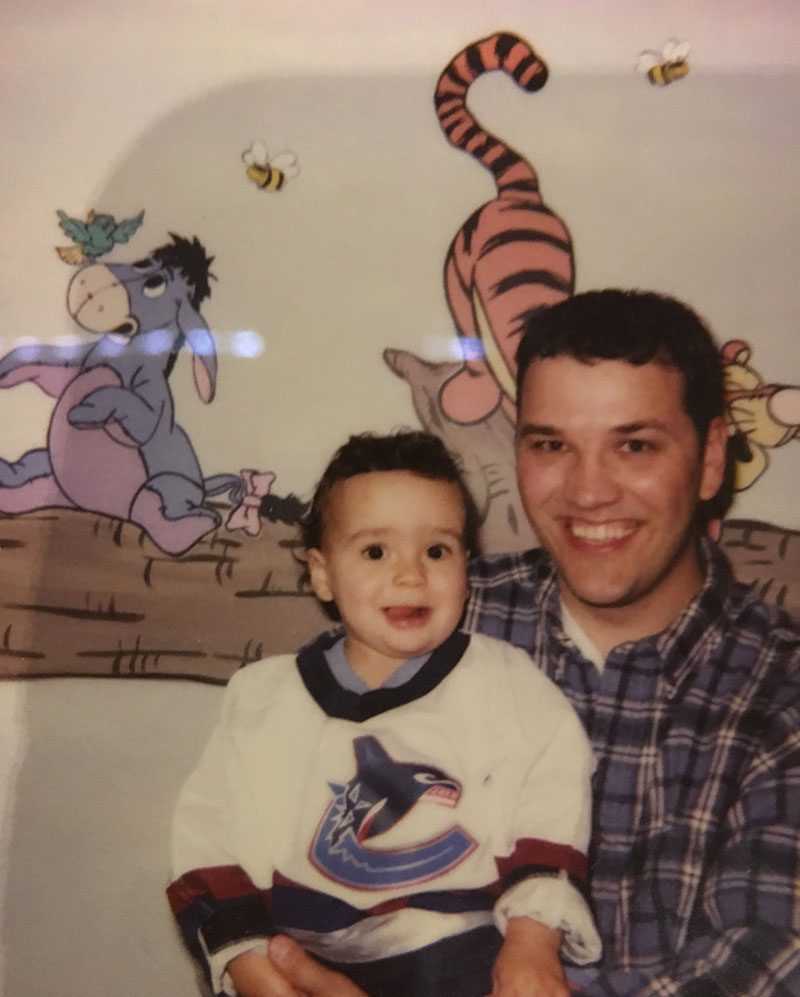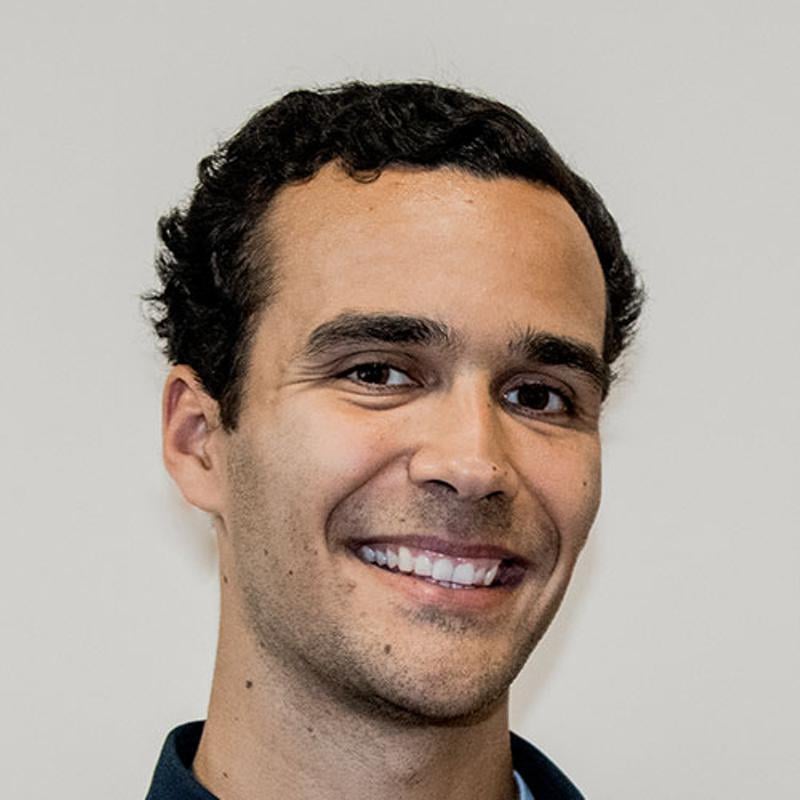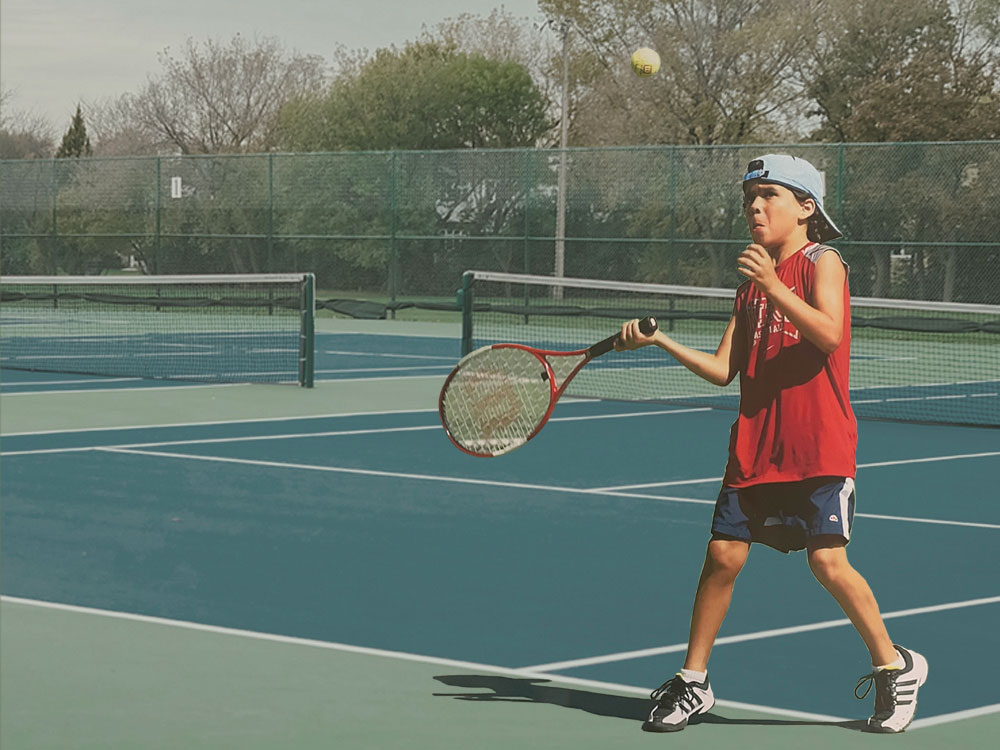The father is on the ropes. His son has just smacked a winner down the line to go up 9-8, one point away from victory. And now, the father reaches into the pocket of his bright blue board shorts for a tennis ball to begin the next rally.
Sweat glistens from his shirtless, 60-year-old body. He’s tanned. Imagine your uncle just back from a six-month Florida vacation. He glows in the October sunshine — it’s obvious that he spends a lot of time on court. His son, who appears to be in his early 30s, is also shirtless, clad in baggy black Air Jordan shorts.
The father stretches his hand out above his waist and drops the ball, hitting it in the air with the racquet in his right hand.
It’s a little after 11 o’clock on a Thursday morning at the public tennis courts at Kitsilano Beach. Each court is full of players. The sounds of thwack, thwack, thwack echo throughout this small section of the park.
I’m scared to approach the father and son. Not because they look intimidating, but for the fact that they have what I so desperately want.
I walk around the fence of the courts to watch other couples play tennis. My head moves back and forth, admiring the two highly skilled players in a rally.
With the score 9-8, the son hits a deep shot close to the baseline. His father returns it and when his son hits the ball back, it lands a little far and the father puts up his right index finger. Out.
“Win by two!” His son shouts.
The father smiles and turns to the fence, grabbing an idle tennis ball on the court.
Playing for love
Time is constant yet we change so significantly around it.
We meet new people and drop out of touch with others. We find new hobbies and let go of old ones. Or sometimes, we rekindle a passion for an old hobby that we discarded long ago.
For me, that old hobby is tennis.
My partner and I started to play tennis towards the end of the summer so we could enjoy a sport together. Tennis is called “the best sport for couples.” We’re both competitive runners, and we saw tennis as a way to bond without thinking about results.
We both know that running is a results-driven sport, where your performance defines you and your ability. From a five-kilometre race to the marathon, your time in a running event translates into your seeding in many races, including the Vancouver Sun Run. Runners will train for years to drop their time by minutes, seconds even, just to be classified by a new number.
My partner and I are both fairly competitive people. With our athletic lives underscored by running and keeping a close eye on the clock, we decided we wanted to play a sport for the enjoyment of playing a sport.
It was a mid-August day when we played tennis for the first time together. As we walked to a set of courts near my house, I felt at peace. We started to rally and laugh as the balls hit the net and spilled all over the court, neither of us caring much about the score.
It was a relief to enjoy tennis without having to fear winning or losing.
It also unearthed complicated feelings for me.
If it makes you happy
The first time I played tennis was nearly two decades ago. I started around the age of eight and played until I was in my pre-teens: it was the first competitive sport I played.
My memories of tennis come in spurts, like flickers of scenes in a film.
There was the time, late at night, in California when the lights above our tennis court were about to go out and my dad asked the court manager to keep them on a little longer.
There was the time I watched Roger Federer and Rafael Nadal play what many believe is “the greatest tennis match of all time” on a grainy television in 2008.
There was the time my dad took me to Pizza Hut for a greasy, cheesy cheese pizza after I made the third round in a junior tournament in Coquitlam.
There was the time I practised my forehand against a wall in the garage and shattered a lamp.
There was the time when my dad and I watched Federer play in the Wimbledon finals during a layover in the Chicago O’Hare airport.
He would always go silent whenever we watched matches. He loved Federer, so naturally I did too. The muscles in my quad would tense when a big point came up. I wanted Federer to win so badly. It was an irrational desire, something I had no control over. But I knew a Federer win would make my dad happy.
To a fault, I always wanted my dad to be happy.
Dad was a successful young tennis player. He told me these harrowing stories of his youth: being ranked number two in the province as an under-12 player, twisting his ankle on a curb one day before a final match and winning the next day, playing with his father in "Dad and Son" tournaments.
Those stories left me in awe. I wanted to be like Dad.
To be clear, my dad never forced or encouraged me to pick up tennis. I took it upon myself to play. Everything I couldn’t tell him — my anxieties, fears and insecurities — I tried to convey through tennis.
While there were aspects of the sport that I loved, specifically the running, I slowly began to hate tennis. I put so much internal pressure on myself to win for him that every time I hit a bad shot or loss, I became less confident speaking to him.
One of the memories that shines in my mind the brightest is when I cried to my old coach, Coach Hassan Askari, during a practice because I didn’t want to play tennis anymore.
I couldn’t hide my emotions on court when drills went south. If I was frustrated with a shot, I’d slowly grind my racquet head into the ground. I’d mope around and slowly pick up balls to delay the next drill.
In hindsight, I see that those reactions were related to my perfectionism and wanting to seem worthy in my father’s eyes.

‘I’m not coaching for me’
Coach Hassan never persuaded me to go back on the court, play in an upcoming tournament or work on my footwork. Instead, he told me, whatever I did in life, to do it for myself. And not anyone else.
“You had these fun, fluffy days,” Coach Hassan said, remembering me as a kid. “And you had the days where it was grinding teeth.”
After over a decade apart, I met him at the Coquitlam Tennis Centre last month. Throughout the afternoon he introduced me to other coaches and athletes in the lobby, and joked about how he tried to push me into a different sport because he realized I wasn’t having fun with tennis.
“If it was falling apart in any drill or skill that wouldn’t come to you, you would use any excuse of your foot pain, back pain, stomach pain,” he recalled. “Until I would crack into you [and you] would say the reality: ‘I’m not good at this, I’m a failure, I’m a disappointment for my dad.'”
I remember the specific practice where he sat me down. It was a winter day. I was quiet and he asked me to sit on a bench. I remember looking over my shoulder to see if Dad could see me crying, looking to see if he noticed that I was spending the time he was paying for — to improve my tennis game — unloading to Coach Hassan about how stressful that very sport was to me.
He inverted my feelings of tennis. I usually felt pressure when I stepped on court, and he gave me space to explore how being on court made me feel. How it stressed me out, thinking that I had to impress my dad.
Coach Hassan gave me those lessons even though it meant he was losing a student.
“One of the fortunes I had early on was to realize I’m not coaching for me,” Coach Hassan said.
“My athletes’ success or lack of success, I don’t own that, they own that. I owe my utmost dedication and honesty in service.”
It took at least three years for Coach Hassan to give me the confidence to feel comfortable asking my dad to quit tennis. For all the consternation, the conversation about quitting was ultimately brief. I remember it being in a car driving back from practice. I kept my head down and didn’t say much.
Although we both knew where the conversation would end up, I still couldn’t get the words “I want to quit tennis” out of my mouth. Dad was supportive and only wanted me to be happy, but I couldn’t see that yet.

We know our parents for only a portion of their lives, so it’s hard to think about what they were like before we were born. I’ve seen photos of my Dad in the 1980s, smiling and having fun with friends. (Yes he had a mullet, in case you were wondering).
That man looks like a stranger. To me, he has only ever been known as Dad. The person who takes care of me, sacrifices their life for me, who only wants me to be happy.
Coach Hassan talked with my dad about his past.
I never knew that until he told me during our recent reunion. Coach Hassan sensed my dad was waging an internal battle between helping me find a passion and pushing me into something I didn’t want to do. Because, Coach Hassan thought, he felt pressure from his father as a boy to excel in tennis.
“He was truly one of the nicest parents I ever met,” Coach Hassan said. “He truly loves you and he did admit, many times, what he’s gone through and how sometimes, inadvertently, he’s trying to not make the same mistakes.”
It’s been proven that parents have a large influence on children’s enjoyment of sports. But how do you balance passing on a love of a sport to your child without placing pressure on them?
‘It means the world’
“I had a racquet in my hand when I was three years old,” Shane Gelhede tells me. He’s the son on court with his father, John Gelhede, who I eventually met at the Kits Beach tennis courts earlier this fall.
Shane says he never felt pressured to play tennis, and developed a love for the game on his own. He especially appreciated the independence.
“Compared to a lot of other sports out there, it’s one-on-one, it’s a battle. It’s like a fight, you don’t have any other teammates to cheer you on, you don’t have any other people you have to rely on.”
Shane started tennis lessons at age 10, and he played competitively until high school. When he stopped, it wasn’t because he lost his passion for tennis.
He wanted to live a “normal life” and when he stopped playing, John was unfazed.
“He understood that it wasn’t for me to pursue it any further, in terms of [playing] competitively at least. He said, ‘No problem, I’ll still support you in anything you do.’”
And although he stopped playing competitively, Shane says tennis has given him the opportunity to remain close with his father as they both get older — they still play together once a month or every few weeks.
“It brought us closer together as father and son, and as friends,” Shane says. “It means the world to me, and it means the world to him.”
Imperfection in a perfectionist sport
Tennis is a sport for perfectionists, Coach Hassan says. Unlike team sports, where a mistake doesn’t always translate into a goal for the other team, every errant tennis shot results in a point against you.
“It almost intuitively requires more of a perfectionist mentality, because the absence of a perfect choice and decision means losing points,” he said.
However, tennis doesn’t have to be viewed through that lens.
Coach Hassan has been coaching for over 15 years now. Instilling that mentality — you don’t have to be perfect in a perfectionist sport — is what motivates his work as a coach.
He compares his philosophy to a person walking a beach, tossing washed-up starfish back to the ocean. Although there may be thousands of them, every one he can return to its habitat in the sea gives him satisfaction.
Tennis might not be a passion for everyone, he admits, and that’s alright. Everyone should have the opportunity to explore what makes them happy.
“It may take 15 years before you come back and tell me, ‘Hassan, you know what, it made a difference in my life.’ I will never know,” Coach Hassan says.
“But it might make that difference in that life.”
Game, set, match
Convincing my Dad to play tennis was easy. Even though I can’t remember the last time we played a match, all I had to do was ask. On a sunny Thanksgiving Sunday afternoon, we start rallying slowly, each of us standing in the middle of our respective sides on a court in Port Moody, where he now lives.
Dad places the ball right by my feet — he always had an uncanny ability to place the ball where he wants. When I hit the ball, especially with my forehand, I pray it gets over the net and lands in.
Initially, we talk about our go-to topic: sports. But I notice that as we start to step back, towards the baseline, our conversation shifts to my partner and work — two vulnerable areas of conversation I wouldn’t have been open to discussing even a few years earlier.
Being the competitive person I am, I suggest we play a one-set match.
The game starts off even. I win the first couple of points, but halfway through the first game Dad storms back and takes a 1-0 lead. As the games go on, I come within a point or two of winning a game, but Dad always finds a way to edge out the win.
With the score of the set 4-0, frustration starts to bubble up in my chest, but I restrain myself. I look at the picture-perfect blue sky on an early fall day.
On match point, I know he’s going to bomb his first serve down the middle.
I move a few feet to the inside and watch a ball whizz by my shoulder. It’s long.
“Out!” I shout.
I creep up a few steps for his second serve and return it to the middle of the court.
We rally for a few shots until Dad notices that I’m leaning too far to the right side of the court, and unleashes a cross-court winner. He raises his hands over his head.
I walk up to the net, shaking my head.
As I get closer, I extend my racquet to his side of the court. ![]()
Read more: Health
















Tyee Commenting Guidelines
Comments that violate guidelines risk being deleted, and violations may result in a temporary or permanent user ban. Maintain the spirit of good conversation to stay in the discussion.
*Please note The Tyee is not a forum for spreading misinformation about COVID-19, denying its existence or minimizing its risk to public health.
Do:
Do not: